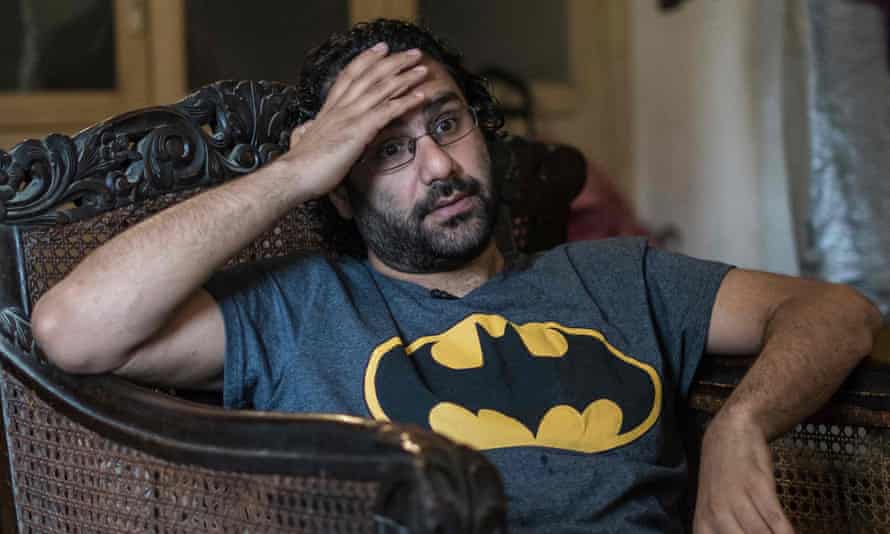Vote Elsissi Heã¢â‚¬â„¢s Making Egypt Great Again
I n early 2011, a generation of Egyptians took to the streets, faced down the security forces and defied the former rule that Egypt's citizens could never exist more than than cowed, obedient children of a war machine state. "I am addressing the youth of Arab republic of egypt today … from the heart, a father's dialogue with his sons and daughters," the 82-year-onetime dictator Hosni Mubarak said every bit he clung to power. In Tahrir Square, tens of thousands of his "sons and daughters" – near of them not all the same born when he inherited power from Anwar Sadat in 1981 – institute this new intimacy unconvincing after the teargas and bullets, and chanted for his downfall.
Sign upwards to our Inside Saturday newsletter for an exclusive behind the scenes look at the making of the magazine's biggest features, as well equally a curated list of our weekly highlights.
By the next day Mubarak was gone, and the protesters were being hailed by the globe leaders who had helped proceed him in function for so long. ("Egypt will never be the same," said Barack Obama, whose assistants gave the country's armed services $1.3bn each year.) One of the best known was the 29-year-old programmer Alaa Abd el-Fattah, already a veteran of street protestation and imprisonment, and a champion of the online spaces that gave immature Egyptians a virtual escape from the stifling political and social repression within their own borders. To many, he personified the narrative of a fresh start made possible partly past the new tools of global information sharing – what the international media labelled a "social media revolution".
Ten years on, a war machine dictator is back in power in Cairo and Abd el-Fattah is back in prison house, aslope an estimated 60,000 other political detainees. You Have Not Yet Been Defeated is a drove of his writings across that turbulent decade, from essays to tweets to reflections scrawled in pencil and smuggled out of prison house, translated and edited past an anonymous commonage of supporters. It opens after the euphoria of Tahrir, in the chaotic days of late 2011, veering from fine-grained arguments over a new constitution to visceral reports of the violence the state was still inflicting on those who defied it. "We fought time with slabs of ice and miserable fans," he says of struggling to preserve bodies retrieved from the Maspero massacre of Coptic protesters; the interim military council locks him upwards over again for his efforts.

This mosaic of texts builds a picture of both the principles of resistance and democracy-building and the ugly, absurd, frightening, occasionally joyful experience of living by them in a stubbornly unreformed dictatorship. It's also a reckoning with the legacy of his much-loved father, the human rights lawyer Ahmed Seif el-Islam, who was imprisoned and tortured under Anwar Sadat and Mubarak. "From my father, I inherited a prison jail cell and a dream," Abd el-Fattah writes. In 2011, he is in prison for the nativity of his son Khaled, simply as his male parent missed the birth of his sis Mona; in 2014, he misses his begetter'southward death, as well.
As the public and individual tragedies mount up, cracks appear in his usual eloquence and certainty: he describes his sadness at leaving Khaled to meet his nightly probation curfew; his fears that imprisonment will get out him permanently unemployable; his struggle, in a succession of lonely, decrepit cells, with despair. "Our sin was pride, not treachery," he writes from prison afterwards the military coup that brought Abdel Fattah el-Sisi – later on described by Donald Trump every bit "my favourite dictator" – to power. "We said, 'We're not like those who came earlier u.s..'" For the revolutionaries, the state'southward massacre of more than 900 Islamist protesters after the coup is a fell turning point "we volition never exist able to escape". In the finish, Egypt'southward past proves impossible to shake.
But similar the success of the revolution in 2011, its defeat isn't only an Egyptian story. The rest of us are the "you" of the book'south title, and the speech it is drawn from makes a call to understand and protect the net as a space for "universal rights and freedoms" – to see and act against taxation avoidance, policy interference, the gig economy, algorithms that promote fake news, the exploitation of our data, our reduction to passive eyeballs for advertisers. "Fix your ain democracy," Abd el-Fattah encourages usa, from his cell; Egypt's rulers attempt to isolate, fragment and conceal resistance because it needs a global ecosystem to flourish. What tin can any 1 person practice with a legacy of pain, struggle and backbone? In that location are no easy solutions here, just You lot Have Not Yet Been Defeated is a heartbreaking, hopeful answer.
Source: https://www.theguardian.com/books/2021/nov/12/you-have-not-yet-been-defeated-by-alaa-abd-el-fattah-review-a-message-to-the-world-from-an-egyptian-prison
0 Response to "Vote Elsissi Heã¢â‚¬â„¢s Making Egypt Great Again"
Postar um comentário